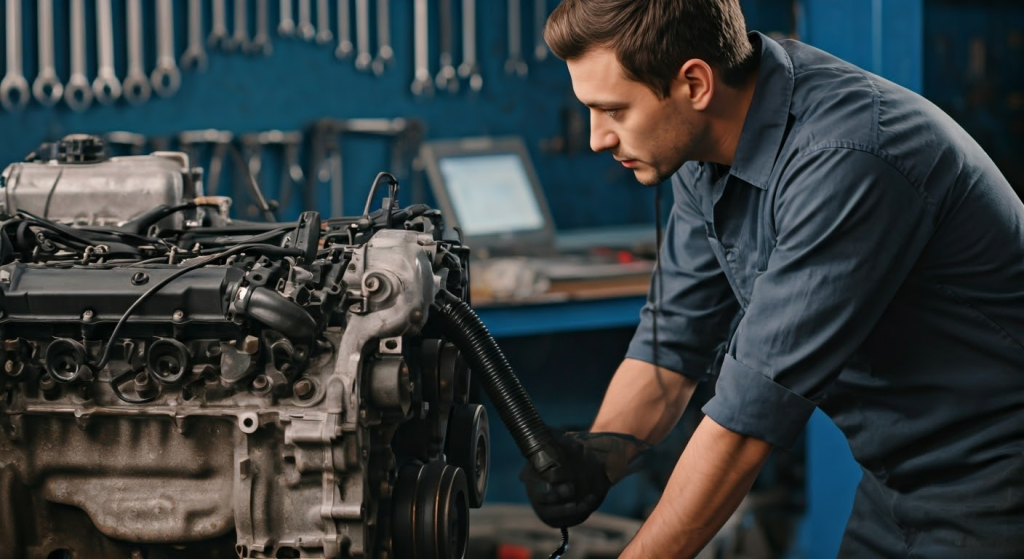
Why Vehicle Diagnostics Are a Must Before Your Next Adventure
Key Highlights
- Investing in vehicle diagnostics before a trip can save you from unexpected breakdowns and costly repairs.
- A professional diagnostic tool can identify hidden problems in your engine, brakes, battery, and other critical systems.
- Checking your tyre pressure and fluid levels ensures optimal vehicle performance and fuel efficiency, including the proper installation of bodykits and carbon fibre trims.
- Vehicle diagnostics provide peace of mind, allowing you to enjoy your adventure without worry.
- Choose a reputable workshop or certified technicians offering comprehensive diagnostic services.
- Regular vehicle diagnostics help to maintain your car’s health, increasing its lifespan and resale value.
Introduction

Before you head out on your next adventure, especially a long road trip, it’s very important to make sure your vehicle is in good shape. You should do a visual check and basic maintenance. But using a professional diagnostic tool for a thorough diagnostic test is key to spotting any hidden problems. This smart step can help you avoid unexpected breakdowns. It also keeps you safe and gives you peace of mind while you travel.
Essential Vehicle Diagnostics Before Your Next Adventure
Preparing your car for a long trip involves more than just packing. You need to check your vehicle’s health to avoid any surprises. Here are some key steps to take before you hit the road:
Today’s cars have advanced monitoring systems. These can help you understand how your automotive business car is working. By using a scan tool and running important diagnostic tests, you can find any hidden problems and enhance the range of services offered. These issues could turn into big troubles while you travel. That’s why many travellers trust Leondis Automotive for a thorough pre-trip inspection, ensuring your car is road-ready before the journey begins.
1. Checking the Engine Management System
The engine is the heart of your vehicle, and it needs to be in good shape, along with various accessories for a smooth drive. A vehicle diagnostics test focuses on the engine management system. This test helps find possible issues that could affect engine performance. A professional scan tool can pull fault codes and give important information about things like the fuel/air mixture, ignition timing, and emissions control systems.
By looking at this data, technicians can find out what causes warning lights on your dashboard, like the check engine light. They can then suggest the needed repairs or changes. Fixing these issues early helps keep the engine performance strong, improves fuel efficiency, and lowers the chances of sudden breakdowns.
2. Assessing the Battery Health and Electrical System
A good battery and a strong electrical system are very important for a smooth trip, especially in remote areas. Battery testers help you check the health and charge level of your battery, making them a great option for both DIY enthusiasts and professionals in a dealership. A scan tool can help you examine the vehicle’s electrical system. It can find possible problems with the alternator, starter, and wiring.
Over time, battery connections might get rusty, which can cause starting issues. A weak alternator might not charge the battery well. This can leave you stuck. Fixing these problems before your trip makes sure your vehicle starts easily. It also helps all electrical parts, like lights and climate control, work well.
3. Verifying Brake System Functionality
When thinking about safety, your vehicle’s brake system is very important. This is especially true for long trips and tough driving conditions. A full diagnostic test includes checking the brake pads and rotors. It also looks for leaks in the brake lines and checks how well the anti-lock braking system (ABS) works.
The ABS is crucial. It stops the wheels from locking up during quick stops, which helps you control the vehicle better. A diagnostic tool can find fault codes related to the ABS. These codes can show problems with their sensors or control module. Fixing brake system issues before your trip helps you stop better and keeps you safer on the road.
4. Inspecting Tyre Condition and Pressure
Making sure your tyres are in good shape and have the right pressure is very important for your safety, saving fuel, and having a smooth ride. Before you head out, check each tyre closely for any damage, like cuts, bulges, or uneven wear. Use proper tyre pressure gauges to help with this.
Keeping your tyres at the right pressure, according to your vehicle’s manual, is necessary. If your tyres are underinflated, it can make it harder to roll, which means you’ll use more fuel. It also raises the chance of overheating and blowouts. On the other hand, if your tyres are overinflated, you can have a rough ride, less grip, and wear them out too soon.
5. Reviewing Fluid Levels and Leaks
Keeping the right fluid levels in your vehicle is very important for its performance and how long it will last. Checking things like engine oil, transmission fluid, coolant, brake fluid, and power steering fluid should be part of your inspection before a trip. You should also look for any signs of leaks.
Low fluid levels can show that there might be leaks or other mechanical issues. If you ignore these, they can cause expensive repairs later. Leaks in engine oil, transmission fluid, or coolant can mean serious problems. These can lead to engine damage or overheating, especially on long trips. A professional diagnostic service can help find leaks accurately. This way, you can get the right repairs done. This keeps your vehicle in good shape and reduces the chance of breakdowns.
Get Road-Trip Ready: Why a Vehicle Check-Up Is Crucial

Preparing your vehicle for a long trip is not just about packing your bags. It’s important to make sure your vehicle is reliable and safe for your journey. A thorough check-up by trusted mechanics can help. It gives you peace of mind, allowing you to enjoy your adventure.
Your car might seem to run well, but there could be hidden problems that worsens as you travel. This can cause breakdowns and surprise costs. Regular diagnostics help you find and fix minor issues before they become bigger problems.
1. Prevent Unexpected Breakdowns
Experiencing a car breakdown during a road trip can mess up your plans and lead to expensive repairs and delays. However, doing a check-up before your trip with the right diagnostic tools can help lower this risk.
When professionals connect their diagnostic tools to your car’s onboard computer and OBD system, they can check how different parts are working. This includes the engine, transmission, brakes, and electrical systems. By finding and fixing minor issues early, you can stop them from turning into big problems that might leave you stuck. This helpful approach gives you peace of mind and lets you enjoy your trip without worrying about unexpected car issues.
2. Ensure Safety for You and Your Passengers
Safety must be your top concern when you drive, especially for long trips. It’s important to have regular checks of your vehicle by certified technicians. This helps keep all safety-related systems working well.
Skilled technicians will carefully look at your vehicle’s brakes, tyres, suspension, and airbags to find any possible problems. They will check how well your vehicle’s safety systems are working and make repairs or adjustments as needed. This ensures the best safety for you and your passengers during your travels.
3. Improve Fuel Efficiency
As fuel prices keep going up, improving your vehicle’s fuel efficiency is very important to lower travel costs. Many people think that fuel efficiency is only about how you drive. However, it also depends on how well your vehicle is running.
One major benefit of getting your vehicle checked regularly is that it can help improve fuel efficiency. Technicians can adjust the engine management system. This makes sure the engine works with precision. As a result, you’ll get better fuel use and create fewer harmful emissions. By doing this, you can save money on fuel over time. That means you can spend more of your money on enjoying your trips.
4. Save Money on Repairs
Some people think that vehicle diagnostics cost too much, but spending money on them can save you a lot later. Finding problems early is usually cheaper and easier to fix.
If you ignore small problems, they can get worse over time. This can lead to bigger and pricier repairs. Advanced diagnostics can find these minor issues before they become bigger problems, helping you avoid spending on costly repairs. Fixing these issues quickly can keep you from having to replace expensive parts or pay for a lot of labour.
5. Peace of Mind for the Journey Ahead
Starting a long trip in a well-kept car gives you peace of mind. This helps you enjoy the journey even more. Vehicle diagnostics are important for this peace of mind. They ensure your car is in great shape.
When you know your car has been fully checked and repairs are done by certified technicians with premium diagnostic equipment, you can relax. With everything in good condition, you can drive on new roads with confidence. You’ve done what you need to do to lower the chances of breakdowns and safety issues.

Conclusion
In conclusion, it is very important to put your mental health first. You can make a big difference in your life by adding small changes to your daily routine. Try to get a good night’s sleep, watch what you eat and drink, take part in activities that help you, and keep a positive attitude. This can help your mental health. Remember, taking care of your mental health is not just nice to do; it is essential for a happy and balanced life. Make yourself a priority, and focus on your mental health.
Frequently Asked Questions
What is the importance of vehicle diagnostics before a trip?
Vehicle diagnostics are important for keeping your car in good shape. They use a special diagnostic tool to check fault codes. This helps to find vehicle issues that might not show a warning light on your dashboard, reducing guesswork. By catching these problems early, a friendly team at a professional workshop can fix them before you hit the road. This way, you can have a safe and smooth trip.
How often should vehicle diagnostics be conducted?
It’s a good idea to have vehicle diagnostics done during your regular car maintenance check at a trusted professional workshop. Even though new vehicles have fewer issues, regular diagnostics help keep all systems running well. They also provide technical support and could be covered by your warranty.
Are there any specific warning signs that indicate the need for vehicle diagnostics?
Watch for warning signs like strange noises, lights on your dashboard, or lower fuel efficiency. If you see any of these signs, it’s important to set up a vehicle check with a professional workshop that uses Autel diagnostic tools. They can find out what’s wrong and suggest repairs.

Leave a Reply